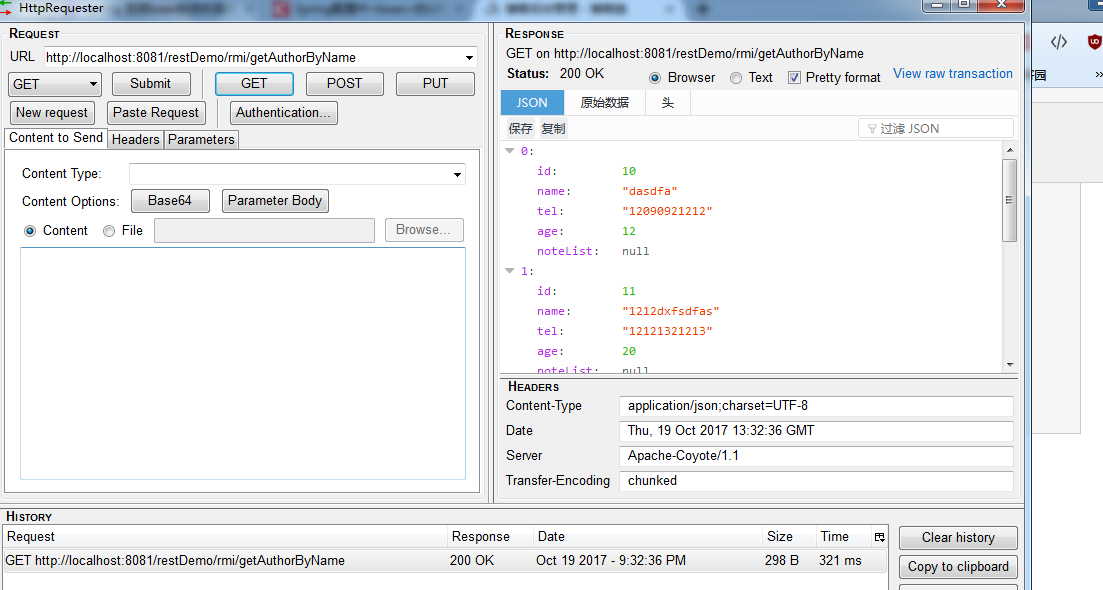环境介绍:本文中服务端客户端使用的都是ssm框架,配置文件分为spring_servlet.xml,spring_service.xml,mybatis.xml
在spring里面使用rmi完成远程调用步骤分以下几步:
一、在服务端
1.编写服务端接口
1 package com.dzf.service; 2 3 import java.util.List; 4 5 import com.dzf.entity.Author; 6 7 public interface RmiServerService { 8 public List<Author> getAuthorByName(String name); 9 10 public Integer insertAuthor(Author author); 11 }
2.编写具体的实现类
1 package com.dzf.service; 2 3 import java.util.List; 4 import org.springframework.beans.factory.annotation.Autowired; 5 import org.springframework.stereotype.Service; 6 import org.springframework.transaction.annotation.Transactional; 7 import com.dzf.dao.AuthorDao; 8 import com.dzf.entity.Author; 9 //@Service //这里面不需要自动注入,需要手写bean 10 public class RmiServerServiceImpl implements RmiServerService { 11 12 @Autowired 13 private AuthorDao authorDao; 14 15 @Override 16 public List<Author> getAuthorByName(String name) { 17 // TODO Auto-generated method stub 18 if(name==null && "".equals(name)){ 19 return null; 20 } 21 return authorDao.getAuthorByName(name); 22 } 23 24 @Transactional 25 @Override 26 public Integer insertAuthor(Author author) { 27 // TODO Auto-generated method stub 28 if(author == null){ 29 return null; 30 } 31 authorDao.insert(author); 32 return author.getId(); //返回的插入这条数据的主键值 33 } 34 35 }
3.在spring-service.xml中添加服务端的配置
1 <bean name = "rmiServerService" class="com.dzf.service.RmiServerServiceImpl"></bean> 2 <bean name="rmiTest" class="org.springframework.remoting.rmi.RmiServiceExporter"> 3 <property name="service" ref="rmiServerService" /> 4 <property name="serviceName" value="rmiServerService" /> 5 <!--这个地方必须写接口的位置全限定名 --> 6 <property name="serviceInterface" value="com.dzf.service.RmiServerService"/> 7 <!-- 这个端口不能和项目的端口一样,是个独立的端口 --> 8 <property name="registryPort" value="8083" /> 9 </bean>
我这里把dao层的写法也贴出来,仅供查考
package com.dzf.dao; import java.util.List; import org.apache.ibatis.annotations.Insert; import org.apache.ibatis.annotations.Options; import org.apache.ibatis.annotations.Select; import org.springframework.stereotype.Repository; import com.dzf.entity.Author; @Repository public interface AuthorDao { @Select("select * from author t where t.id = #{id}") public Author getAuthorById(Integer Id); @Select("select * from author t where t.name like concat('%',#{name},'%')") public List<Author> getAuthorByName(String name); @Insert("insert into author(name,age,tel) values (#{name},#{age},#{tel})") @Options(useGeneratedKeys=true,keyProperty="id") public Integer insert(Author author); }
二、客户端(调用端的配置)
1.编写一个和服务端一模一样的接口
1 package com.dzf.service; 2 3 import java.util.List; 4 5 import com.dzf.entity.Author; 6 7 public interface RmiServerService { 8 public List<Author> getAuthorByName(String name); 9 10 public Integer insertAuthor(Author author); 11 }
2.编写配置文件
1 <!-- Spring Rmi 客户端配置 --> 2 <bean id="rmiServerService" class="org.springframework.remoting.rmi.RmiProxyFactoryBean"> 3 <property name="serviceUrl" value="rmi://127.0.0.1:8083/rmiServerService"/> 4 <property name="serviceInterface" value="com.dzf.rmi.service.RmiServerService"/> 5 <property name="lookupStubOnStartup" value="false"/> 6 <property name="refreshStubOnConnectFailure" value="true"></property> 7 </bean>
3.编写controller层的代码
1 package com.dzf.rmi.controller; 2 3 import java.util.List; 4 5 import org.springframework.beans.factory.annotation.Autowired; 6 import org.springframework.stereotype.Controller; 7 import org.springframework.web.bind.annotation.RequestMapping; 8 import org.springframework.web.bind.annotation.ResponseBody; 9 10 import com.dzf.entity.Author; 11 import com.dzf.rmi.service.RmiServerService; 12 13 @Controller 14 @RequestMapping("/rmi") 15 public class RmiServlet { 16 17 @Autowired 18 private RmiServerService rmiServerService; //这个起的名字要和配置文件里面的一样 19 20 @RequestMapping("/getAuthorByName") 21 @ResponseBody 22 public List<Author> getAuthorByName(){ 23 String name = "a"; 24 return rmiServerService.getAuthorByName(name); 25 } 26 27 28 @RequestMapping("/insert") 29 @ResponseBody 30 public Integer insert(){ 31 Author author = new Author(); 32 author.setName("丁"); 33 author.setAge(23); 34 author.setTel("13033563156"); 35 return rmiServerService.insertAuthor(author); 36 } 37 38 }
4.使用接口工具调用
1.

2.

到此可以看到,调用完全没有问题!
总结下:
核心
1.服务端通过org.springframework.remoting.rmi.RmiServiceExporter这个类暴露服务接口
2.服务端和客户端定义同样的接口
3.调用端通过org.springframework.remoting.rmi.RmiProxyFactoryBean调用服务端的暴露的接口
注意:实体类需要实现序列化接口!